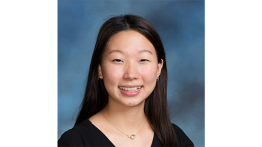Faith Lin EE'24 Selected for State Department Information Technology Fellowship
POSTED ON: May 6, 2022

Faith Lin, a sophomore studying electrical engineering, is one of 15 students nationwide selected by the U.S. Department of State for the Foreign Affairs Information Technology (FAIT) Fellowship. The two-year State-Department–funded fellowship program is for undergraduate or graduate students pursuing an IT-related degree who are interested in a Foreign Service career. Fellows are granted academic funding for two years, two summer internships (one at the State Department in Washington D.C. and one at a U.S. embassy or consulate overseas), professional development, and mentorship. After completing the program, Lin will receive an appointment in the Foreign Service as an Information Management Specialist.
“The FAIT Fellowship will allow me to fully appreciate and focus on my specific area of interest in information technology and cyber security in the context of meaningful service to the country,” says Lin. “I am ready to immerse myself in a program that encourages leadership, teamwork, and professional development. I’m excited to commit to a career in the Foreign Service that will allow me to grow as a leader and a responsible global citizen while serving the people of the United States.”
Of the 15 FAIT Fellows for the 2022 cohort, seven have been awarded fellowships in the graduate program, eight in the undergraduate.




